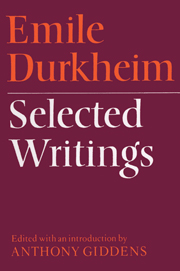Book contents
- Frontmatter
- Contents
- Preface
- Abbreviations
- Introduction: Durkheim's writings in sociology and social philosophy
- 1 The field of sociology
- 2 Methods of explanation and analysis
- 3 The science of morality
- 4 Moral obligation, duty and freedom
- 5 Forms of social solidarity
- 6 The division of labour and social differentiation
- 7 Analysis of socialist doctrines
- 8 Anomie and the moral structure of industry
- 9 Political sociology
- 10 The social bases of education
- 11 Religion and ritual
- 12 Secularisation and rationality
- 13 Sociology of knowledge
- Index
12 - Secularisation and rationality
Published online by Cambridge University Press: 05 August 2012
- Frontmatter
- Contents
- Preface
- Abbreviations
- Introduction: Durkheim's writings in sociology and social philosophy
- 1 The field of sociology
- 2 Methods of explanation and analysis
- 3 The science of morality
- 4 Moral obligation, duty and freedom
- 5 Forms of social solidarity
- 6 The division of labour and social differentiation
- 7 Analysis of socialist doctrines
- 8 Anomie and the moral structure of industry
- 9 Political sociology
- 10 The social bases of education
- 11 Religion and ritual
- 12 Secularisation and rationality
- 13 Sociology of knowledge
- Index
Summary
THE DEVELOPMENT OF CHRISTIANITY
The religions of Antiquity are, above all, systems of rites, the essential objective of which is to assure the regular working of the universe. For the wheat to spring up and yield an abundant harvest, the rivers to flow, and the stars to move in their appointed paths, the gods of the harvest, the gods of the rivers, and the gods of the stars must subsist, and it is the rites which allow them to do so. If they ceased to take place on the established days, and in the prescribed manner, the life of the universe would come to an end. It is understandable that the attention of the Greek should be entirely directed towards the outside, where, according to him, the principle of existence is to be found.
By contrast, Christian religion is centred in man himself, in the soul of man. An essentially idealistic religion, its god aspires to reign over the world of ideas, over the spiritual world, and not that of the body. To worship the gods of Antiquity was to maintain their material life with the help of offerings and sacrifices, since their life depended upon that of the world; the god of the Christians, on the other hand, wishes to be worshipped, as the phrase expresses it, in spirit and in truth. For him, to be, is to be believed, to be thought, to be loved. Everything thus inclines the Christian to turn his thought towards himself, because the source of life is to be found within himself: I mean true life, that which counts most in his eyes, the life of the spirit.
- Type
- Chapter
- Information
- Emile Durkheim: Selected Writings , pp. 239 - 249Publisher: Cambridge University PressPrint publication year: 1972



